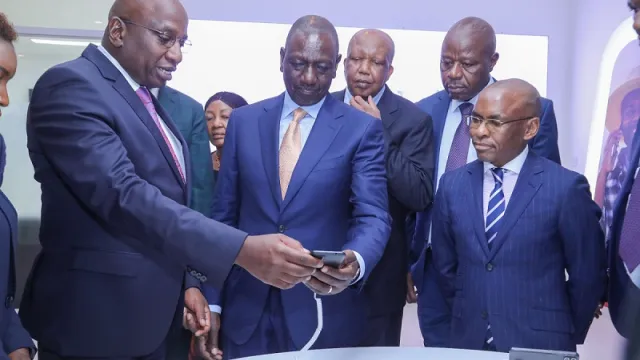New smartphone plant boosts 'Made in Kenya' movement

New smartphone plant boosts 'Made in Kenya' movement
Kenyans can now purchase locally assembled smartphones following the launch of the East Africa Device Assembly Kenya Limited (EADAK), situated in Athi River. This development advances the country's efforts to enhance manufacturing as part of the "Made in Kenya" initiative, and it is expected to result in cost savings, with locally-made smartphones projected to be 30 percent more affordable than imported ones.
President William Ruto presided over the EADAK plant's inauguration, emphasizing its significant role in advancing his government's digital highway and transformation agenda. The device assembly plant is a collaborative endeavor involving local Mobile Network Operators Safaricom and Jamii Telecommunications, along with international device manufacturers Telecom One. According to the partners, this initiative will expedite the penetration, usage, and growth of 4G networks by making affordable handsets available to all.
EADAK smartphones in use by MoH
ICT Minister Eliud Owalo praised the partnership with the private sector in the digital highway agenda, recognizing its immense significance. The Ministry of Health has received an order for 100,000 handsets from EADAK, which will be used for communication and data collection by Community Health Promoters under the ministry.
EADAK's facility underscores the government's commitment to establishing a local smartphone assembly plant in Kenya, which, in turn, creates employment opportunities as the country aspires to become the "Savannah's Silicon Valley."
Kenya's launch of EADAK comes four years after Rwanda unveiled Africa's "first high-tech smartphone factory" in 2019. Located in Kigali, the Mara Phones Factory began manufacturing two brands, Mara X and Mara Z. President Paul Kagame noted at the launch in 2019, "It is another milestone on our journey to a high-tech 'Made in Rwanda' industry."
The smartphone plant in Kenya has the capacity to produce up to three million mobile phone units annually and is expected to generate between 300 and 500 direct jobs, promote local talent development, and contribute to the country's economic growth.
During the launch, two new devices were introduced, the Neon Smarta and Neon Ultra, priced at Kes7499 and Kes8999, respectively. These devices are currently available nationwide at Faiba shops, dealer stores, Safaricom shops, and the Masoko online platform.
Joshua Chepkwony, Chairman of EADAK and CEO of Jamii Telecom, stated, "We have achieved affordability through a collaborative approach that includes industry partnerships and favorable government policies."
Read also: Korea scales up investment in Konza smart city
Affordability of smartphones
Despite widespread internet penetration across Kenya, over 60 percent of the population was using feature phones primarily due to the inability to afford smartphones. President William Ruto announced that the phones will come pre-installed with an e-citizen app, enabling Kenyans to easily access government services. A year ago, there were only 320 services available; now there are up to 13,000. The devices will also include data bundles worth $10 to unlock the full functionality of the smartphone for users.
In collaboration with the private sector, the government will explore ways to make payment plans more accessible, allowing a Kes1000 deposit and a daily deposit of Kes20, to ensure that the device is affordable to the majority.
The journey to establish EADAK began 11 months ago when the President encouraged Safaricom CEO Peter Ndegwa and Jamii Telecom's Joshua Chepkwony to invest in the venture to support the government's digital transformation agenda. Mr Ndegwa stated that Safaricom aims to provide over 20 million customers with 4G-enabled devices under the firm's handset purchase plan, "Lipa Mdogo Mdogo."



